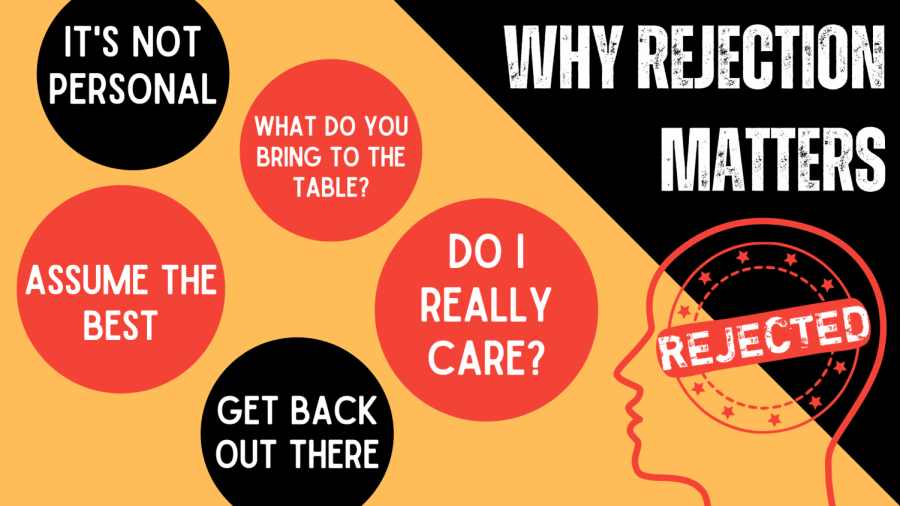Why Rejection Matters
Opinion editor Arielle Chin writes that rejection is not a mark of failure, but instead an opportunity to grow.
June 7, 2023
Whether it is dealing with heartbreak, getting cut from the varsity team, or not getting into our dream college or job, rejection is hard but necessary for everyone to deal with.
When faced with rejection, we arduously examine ourselves to figure out why we weren’t accepted. Questions like “Why wasn’t the ‘perfect’ candidate for the role?” and “What could I have done differently to be accepted?” seep through our confidence and begin to cloud our self-esteem.
According to psychologist Guy Winch, “The greatest damage rejection causes is usually self-inflicted. Just when our self-esteem is hurting most, we go and damage it even further.” Our self esteem not only suffers at the hands of rejection, but also further deteriorates due to our negative self-talk.
However, without rejection, we would not be able to stay humble, grounded and rise up as a stronger individual. Rejection is not an easy feat to overcome, but learning how to pick ourselves back up, dusting off our negative thoughts and casting them behind us can allow us to see the glass half full.
When we don’t face enough rejection, we fall into the trap believing that we deserve every opportunity we apply ourselves to. However, that is not how life works.
I, for one, have dealt with rejection on multiple occasions. Two months ago, I applied for a paid fellowship opportunity and was granted the opportunity to speak with two representatives of the program.
Unfortunately, just two weeks after my interview, I received an email outlining that I was not one of the chosen applicants to be a part of their selective program. At first, I was extremely saddened to receive this news as I had dedicated a lot of time in the application process.
However, while I was dwelling in my self-pity and confusion, I didn’t even stop to congratulate myself for making it this far and trying the best that I could.
Soon after, I refreshed my personal email inbox and came across an email from one of the other organizations saying that I was invited as “one of the select few chosen to receive complimentary admission” to their spring session.
I was quite shocked and in disbelief because I was presented with another opportunity to be able to learn similar skills from the other program I did not get into.
This lesson is just one of many examples of my encounters with rejection where the final outcome turned out to be just as rewarding as the original outcome I wanted.
Senior Jeffy Chandramohan, who is now committed to Bentley University, shared her experience with rejection from her dream college.
“I had ED’d to Babson College because I thought it was my dream college,” Chandramohan said. “When I was rejected from Babson, it broke me. Eventually, time made things better and I realized that Bentley was actually so much better for my Finance major. So, I’m thankful Babson said no, because who knows what would’ve happened if I had gone there. I’d like to believe I would’ve regretted it. So I’m much much happier now.”
Junior Swetha Govindarajan shared how rejection has taught her to persevere.
“I had made the effort of making friends with a classmate; however, things didn’t work out,” Govindarajan said. “This experience taught me the importance of understanding the interests of others and how I should make an equal effort when making friends. It also serves as a reminder that not all relationships will succeed, and we should not be discouraged if it does not work out.”
According to NBC’s Better by Today, there are steps that can be taken to help one bounce back from rejection.
“The first step is to focus on what you can bring to the table by making efforts to revive self-esteem, focusing on positive qualities, and remembering why our attributes might be appreciated by someone else,” NBC writer Sarah DiGulio said. “The second step is to ask yourself if it really matters or if you really care by distinguishing whose rejection matters to us. The third step is to remember that, a lot of times, rejection isn’t personal. The fourth step is to choose to assume the best rather than the worst through choosing the assumption that’s less painful and less hurtful. The fifth step is to get back out there after rejection because withdrawing doesn’t help.”
Rejection teaches us that some things are just not meant to be. Although it is difficult to admit that we are not cut out for some things, dwelling on why we were “rejected” should not be what defines our path forward. We need to trust the plan we set for ourselves and work towards attainable goals as this is the only way to heal from rejection and seek new opportunities.










